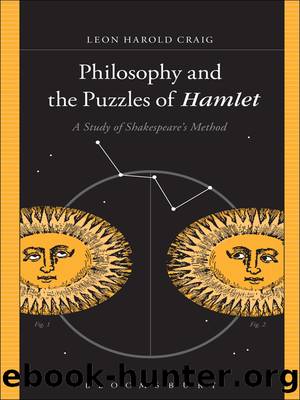Philosophy and the Puzzles of Hamlet by Craig Leon Harold

Author:Craig, Leon Harold.
Language: eng
Format: epub
ISBN: 9781628920482
Publisher: Bloomsbury USA
Published: 2014-07-14T16:00:00+00:00
The busy life of John Dee (1527–1608) – the most illustrious polymath of the period, but equally famous, and infamous, as a magus – provides an ideal ‘mirror’ wherein to view the intellectual ferment and adventure of the ‘very age and body of the time’. Connected as he was with most of the other prominent philosophic–scientific intellects of his day, as well as with many of its leading explorers, adventurers, and political figures, he epitomizes the complex mix of the new and the old – of both rigorous empirical investigations and occult hocus-pocus, hence of both the solid achievements and the extravagant flights of fancy – of which he and his contemporaries variously partook.28 Incarnating the florid cultural ambience of the London in which Shakespeare attained his intellectual maturity, it is easy to believe that Dr Dee was, in whole or in part, the inspiration for Marlowe’s Faust and Jonson’s Alchemist, but most especially for Shakespeare’s Prospero.29
Until fairly recently, however, Dee’s importance to the early history of modern science was obscured by anachronistic prejudices among scholars with regard to astrology, alchemy and any sort of ‘spiritualism’ – Dee being deeply implicated in all these now discredited lines of activity. Like so many of his philosophic–scientific contemporaries, he was intrigued by the possibility of alchemy, and had been so since his university days. But in the 1580s it became his dominant preoccupation, which he pursued first in England and then for six years on the Continent, primarily in the company of one Edward Kelley who acted as Dee’s ‘skryer’, that is, someone with a peculiar talent for communicating with angels or other spirits (typically by means of a special crystal or some equivalent in which such beings supposedly revealed themselves and their messages). With Kelley serving as Dee’s ‘medium’, the aging magus hoped to learn from divine sources the deepest secrets of Nature, including that of how to transmute base metals into gold and silver. It was the survival of his own – unfortunately detailed – accounts of these supposed communications with various celestial beings (via his ever-plausible skryer) that have cast Dee’s intellect in the worst light, leading many historians to grossly undervalue his many other achievements.
The mercurial Kelley eventually struck out on his own, and garnered an enormous reputation as an alchemist who could transform the metal of virtually any object into gold. Needless to say, this was a skill that every cash-strapped prince would have endless uses for, and Queen Elizabeth was no exception. Accordingly, her chief minister was tireless in trying to lure Kelley back to England, but without success.30 Meanwhile, princely interest in Dee waned to the point that he was without the support of any willing patron in Europe. So at last, disillusioned in Kelley, but not necessarily in alchemy nor in the possibility of spiritual communication, the then 62-year-old magus returned to England.
Given the benefit of scientific hindsight, one may confidently dismiss Kelley as just an especially clever charlatan, and consequently disdain Dee as a fool for being so easily conned.
Download
This site does not store any files on its server. We only index and link to content provided by other sites. Please contact the content providers to delete copyright contents if any and email us, we'll remove relevant links or contents immediately.
| Ancient & Classical | Arthurian Romance |
| Beat Generation | Feminist |
| Gothic & Romantic | LGBT |
| Medieval | Modern |
| Modernism | Postmodernism |
| Renaissance | Shakespeare |
| Surrealism | Victorian |
4 3 2 1: A Novel by Paul Auster(11052)
The handmaid's tale by Margaret Atwood(6856)
Giovanni's Room by James Baldwin(5879)
Big Magic: Creative Living Beyond Fear by Elizabeth Gilbert(4723)
Asking the Right Questions: A Guide to Critical Thinking by M. Neil Browne & Stuart M. Keeley(4576)
On Writing A Memoir of the Craft by Stephen King(4214)
Ego Is the Enemy by Ryan Holiday(3991)
Ken Follett - World without end by Ken Follett(3973)
The Body: A Guide for Occupants by Bill Bryson(3802)
Bluets by Maggie Nelson(3711)
Adulting by Kelly Williams Brown(3671)
Guilty Pleasures by Laurell K Hamilton(3587)
Eat That Frog! by Brian Tracy(3514)
White Noise - A Novel by Don DeLillo(3436)
The Poetry of Pablo Neruda by Pablo Neruda(3367)
Alive: The Story of the Andes Survivors by Piers Paul Read(3312)
The Bookshop by Penelope Fitzgerald(3229)
The Book of Joy by Dalai Lama(3218)
Fingerprints of the Gods by Graham Hancock(3214)
